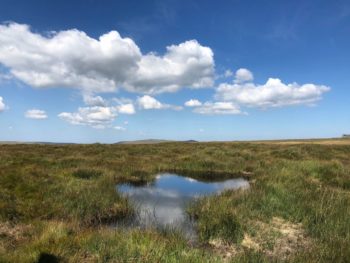Water Net Gain
Competition: Breakthrough 3: Catalyst
Amount awarded: £999,800
Led by: South West Water
Partners: Westcountry Rivers Trust, Rivers Trust, South West Water, Duchy College, Environment Agency, Saputo Dairy UK, United Utilities, Severn Trent Water, Anglian Water, Portsmouth Water (Advisory Panel only), South East Water (Advisory Panel only), Southern Water (Advisory Panel only)
Project completion date: May 2027
Water cycle tag: Rivers, catchments, groundwater
Water Net Gain is a catchment-scale approach whereby farmers are paid to store water on their land. Restoring natural sponges, like healthy soils, woodlands and wetlands, can passively contribute water to summer base flows, but the creation of additional smart ponds and lakes, can be used for farm demand management or active releasing flows during droughts. The impact of this distributive ecologically connected water bank, released to the river during droughts, dilutes residual pollution not managed through current agricultural water quality incentivisation schemes. Alongside water purification, water retention solutions are designed to provide additional flood protection and aquatic biodiversity benefits.
Water Net Gain is a research and development project initially focused in the Tamar, Otter and Fowey catchments.
“Water Net Gain comes at a pivotal point for South West Water as climate change forecasts predict even more challenges for managing water. By making the most of the rain we receive we can ensure enough water for both our communities and for the habitats and wildlife in our rivers.” – Carolyn Cadman, Director of Natural Resources, South West Water
—
Update from the project (July 2025)
We are now designing the demonstration pond in partnership with Duchy College, which included some initial site survey and preparation works. The cost assessment has provided a basis for understanding how much an operational Water Net Gain would cost, including project management, pond design, planning and construction, as well as farmer compensation, maintenance and monitoring. We have procured professional tax advice, to make sure that the WNG scheme set-up does not have negative tax implications for farmers who would like to take part. This helped to further define the payment set-up, example clauses for a contract and ownership details for the final scheme. For the Willingness to Accept study, we established a partnership with the Rivers Trust, Mersey Rivers Trust, Essex and Suffolk Rivers Trust and Trent Rivers Trust. This means that we can explore farmers’ willingness to participate in Water Net Gain in different parts of the country, looking at different catchments and types of farming, together with a local partner that is trusted within the farming community.


